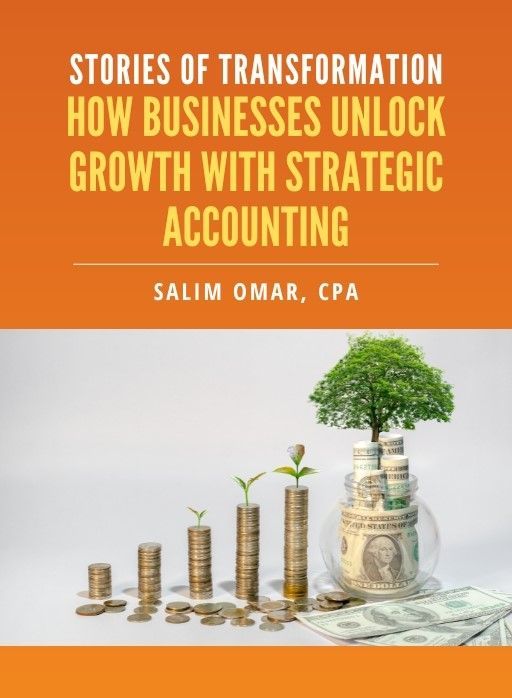The Tax Risks of Dropshipping—and How a CPA Can Help

Running a dropshipping business sounds like a dream—low overhead, no inventory headaches, and the ability to sell almost anything from anywhere. But behind the ease of online storefronts lies a minefield of tax confusion. Between murky sales tax laws, multiple shipping locations, and unclear expense deductions, it’s no wonder many dropshippers end up with a surprise tax bill—or worse, penalties. The good news? A knowledgeable CPA can clean up the mess and even uncover opportunities you might’ve missed.
Dropshipping Taxes: Why It’s So Complicated
Here’s where the chaos starts: traditional retailers know where their inventory is, who owns it, and where it's going. Dropshippers? Not so much. You might be selling a phone case from your living room in Texas, sourcing it from a supplier in California, and shipping it to a customer in New York. That simple transaction just triggered tax obligations in multiple states.
Common Tax Pitfalls Dropshippers Face
Let’s unpack the biggest risks that could be lurking under the hood of your dropshipping operation:
1. Sales Tax Nexus Confusion
“Nexus” is tax lingo for a connection to a state that requires you to collect and remit sales tax there. With dropshipping, nexus can pop up in more places than you’d think:
- Economic nexus: Sell over a certain threshold in a state (say $100,000 in sales), and you’re on the hook—even if you’ve never set foot there.
- Inventory nexus: If your supplier stores inventory in a warehouse in another state (like through a fulfillment center), that could create physical nexus too.
Bottom line? You could owe sales tax in 10+ states without realizing it.
2. Wrong Party Collecting Tax
Here’s a twist—sometimes the supplier, not you, is responsible for collecting tax, depending on whether you or they are considered the “retailer of record.” Get this wrong and double taxation—or no taxation—can happen. Either one spells trouble with state tax authorities.
3. No Clear Documentation Trail
Many dropshippers skip over proper documentation, like resale certificates, and hope for the best. That’s risky. Missing paperwork can mean you end up paying tax on items you should’ve been exempt from.
4. Unclaimed or Overlooked Deductions
Let’s talk write-offs. Sure, you’re tracking ad spend and platform fees, but what about:
- Transaction fees from PayPal or Stripe?
- Outsourced VA costs?
- Shopify app subscriptions?
- Home office internet used for your store?
If your books are messy or you're mixing personal with business,
deductions might slip through the cracks—or worse, trigger audits.
How a CPA Simplifies Your Dropshipping Taxes
Trying to untangle tax rules on your own is like navigating a maze blindfolded. That’s where a CPA—especially one familiar with ecommerce—comes in clutch. Here’s how Straight Talk CPAs steps in:
1. Clarifying Your Sales Tax Nexus Map
A CPA will analyze where your customers are, where your suppliers are, and where any inventory might touch down. Based on that, they’ll help you figure out where you actually need to register, collect, and remit sales tax. No more guessing or hoping for the best.
2. Setting Up Sales Tax Automation
No, you don’t have to manually calculate and file taxes in 25 states. A good CPA will help integrate tools like TaxJar or Avalara to automatically collect the right amount of sales tax from each customer—state, city, and county included.
3. Ensuring You’re Not Overpaying
From claiming the correct business expenses to avoiding double taxation, CPAs know what to deduct and how to prove it. They also spot red flags that could attract IRS attention, and help you correct them before an auditor does.
4. Helping You Stay Compliant Year-Round
Forget scrambling every April. With quarterly estimated payments, proper bookkeeping, and year-round support, a CPA ensures you’re never caught off guard. They’ll also help separate business and personal finances—so your online store doesn’t take down your
personal tax return with it.
Real Example: How a CPA Saved a Dropshipper Thousands
One ecommerce seller came to Straight Talk CPAs after getting a letter from a state revenue department. Turns out, their supplier had inventory in multiple states, creating physical nexus—but they’d never registered to collect sales tax outside of their home state.
Worse? They were paying tax on every wholesale purchase and collecting tax from customers—essentially paying twice.
STCPAs helped them:
- Register for sales tax only where needed
- Properly file resale certificates with their suppliers
- Set up automated tax collection at checkout
- Refile prior-year returns and request overpaid tax refunds
In the end, the dropshipper avoided penalties and recouped over $7,000. Not bad for a few hours of cleanup.
CPA vs. Bookkeeper: What’s the Difference?
Many online sellers start with a bookkeeper—and that’s a great first step. Bookkeepers are pros at tracking your day-to-day transactions, organizing receipts, and keeping your records in order. If you need someone to handle the nuts and bolts of your financial recordkeeping, that’s their wheelhouse.
But when it comes to the bigger picture—like tax strategy, compliance in multiple states, and preparing accurate filings—a CPA brings a different level of expertise. CPAs are trained to help you save money, stay compliant, and plan for future growth. They don’t just keep your books clean—they make sure your entire financial setup supports your business goals.
In short, a bookkeeper helps with the daily details, while a CPA steps in for the strategy and legal side of things. Need both? Straight Talk CPAs offers integrated support so you don’t have to juggle multiple providers.
Final Thoughts
Dropshipping is already a fast-moving, high-pressure business. Don’t let taxes slow you down. Straight Talk CPAs helps ecommerce sellers like you simplify the mess, stay compliant, and keep more of what you earn. No jargon. No fluff. Just straight answers and real solutions that scale as your store grows.
Free eBook:
Stories of Transformation


Salim is a straight-talking CPA with 30+ years of entrepreneurial and accounting experience. His professional background includes experience as a former Chief Financial Officer and, for the last twenty-five years, as a serial 7-Figure entrepreneur.




